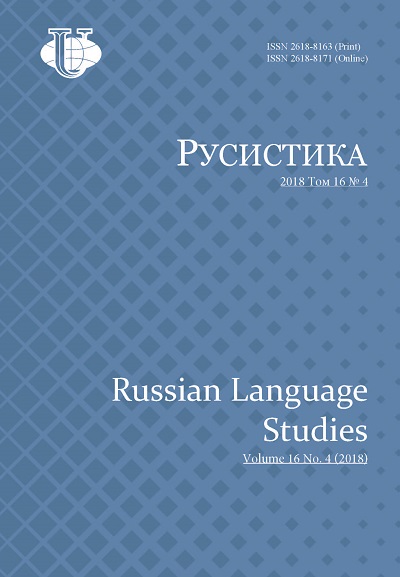The logic of the role computer game in Russian language functioning and study
- Authors: Vinogradov S.N.1
-
Affiliations:
- Lobachevski State University of Nizhny Novgorod
- Issue: Vol 16, No 4 (2018)
- Pages: 398-411
- Section: Actual Problems of Russian Language Studies
- URL: https://journals.rudn.ru/russian-language-studies/article/view/20265
- DOI: https://doi.org/10.22363/2618-8163-2018-16-4-398-411
- ID: 20265
Cite item
Full Text
Abstract
The actuality of the article is conditioned by the significant role of game elements in language functioning and in teaching linguistic disciplines, as well as by the importance of computer technology in modern society. The purpose of the article is to compare the logic (i.e. organization, structure) of a role-playing computer game (RPG) and communicative and research activity. The results of this comparison can be used in teaching a language and in linguistic studies. The research material includes the terms from the RPG sphere, language units and rules which are used in language activities. The research methods are observation and description, realized by the means of comparison and modeling, as well as of semiotic methods. The article analyzes semantic and structural connection between RPG elements (the personage, abilities and skills of the personage, quests, resources, research and development) and elements and patterns of communicative and research activity (communicator, language abilities and skills, the purpose of communication, language means). The functional similarity between the objects being compared on the base of universal RPG semiotics and language functioning is pointed out. It is shown how RPG logic helps to perform linguistic tasks on the example of Russian grammar categories (singular and plural forms of nouns, lexical and grammatical categories of adjectives). The author presents exercises for teaching the Russian language where pupils’ activity implicitly includes RPG logic.
About the authors
Sergey Nikolaevich Vinogradov
Lobachevski State University of Nizhny Novgorod
Author for correspondence.
Email: vinogradov54@mail.ru
Doctor of Philology, Associate Professor, Professor of the Chair of Modern Russian Language and General Linguistics, Institute of Philology and Journalism, Lobachevsky State University of Nizhny Novgorod
23 Gagarina Ave., Nižniy Novgorod, 603950, Russian FederationReferences
- Apresyan, Yu.D. (1966). Idei i metody sovremennoi strukturnoi lingvistiki [Ideas and Methods of Modern Structural Linguistics]. Moscow: Prosveshchenie Publ. (In Russ.)
- Berezin, F.M., & Golovin, B.N. (1979). Obshchee yazykoznanie [General Linguistics]. Moscow: Prosveshchenie Publ. (In Russ.)
- Vinogradov, S.N. (2015). O soderzhanii terminov, oboznachayushchie leksiko-grammaticheskie razryady sushchestvitel’nykh. Vestnik Nizhegorodskogo universiteta im. N.I. Lobachevskogo [On The Content of the Terms Denoting Lexico-Grammatical Groups of Nouns. Bulletin of Lobachevsky State University of Nizhnii Novgorod]. (In Russ.)
- Vinogradov, S.N. (2014). Paradigmaticheskii vybor kak model’ problemnoi situatsii sozdaniya teksta. Russkii yazyk: istoricheskie sud’by i sovremennost’: V Mezhdunarodnyi kongress issledovatelei russkogo yazyka (Moskva, MGU im. M.V. Lomonosova, filologicheskii fakul’tet, 18—21 marta 2014): trudy i materialy [The Paradigmatic Choice as a Model of Problematic Situation in Text Creation. Russian Language: Its Historical Destiny and Present State. The Fifth International Congress of Russian Language Researchers (Moscow, Lomonosov State University, Faculty of Philology, March 18—21, 2014): Proceedings and materials (pp. 372—373)]. Moscow: Moscow State University Publ. (In Russ.)
- Vitgenshtein, L. (1994). Filosofskie raboty [Philosophical Works]. Moscow: Gnozis Publ. (In Russ.)
- Glotova, G.A. (1990). Chelovek i znak. Semiotiko-psikhologicheskie aspekty ontogeneza cheloveka [Man and Sign. Semiotic-Psychological Aspects of Human Ontogenesis]. Sverdlovsk: Izd-vo Ural’skogo universiteta Publ. (In Russ.)
- Golovin, B.N. (1980). Osnovy kul’tury rechi: ucheb. posobie [Basic Notions of Speech Culture: textbook]. Moscow: Vyssh. shkola Publ. (In Russ.)
- Gorelov, I.N. (1987). Razgovor s komp’yuterom: psikholingvisticheskii aspekt problemy [Talking With Computer. Psycholinguistic Aspect of the Problem]. Moscow: Nauka Publ. (In Russ.)
- Grinev-Grinevich, S.V., & Sorokina, E.A. (2012). Osnovy semiotiki: ucheb. posobie [Basic Semiotics: textbook]. Moscow: Flinta Publ. (In Russ.)
- Dridze, T.M. (1984). Tekstovaya deyatel’nost’ v strukture sotsial’noi kommunikatsii [Text activity in the structure of social communication]. Moscow: Nauka Publ. (In Russ.)
- Kasatkin, L.L., Klobukov, E.V., & Lekant, P.A. (1991). Kratkii spravochnik po sovremennomu russkomu yazyku [Brief Reference Book on Modern Russian Language]. Moscow: Vyssh. shkola Publ. (In Russ.)
- Komp’yuternaya rolevaya igra. Vikipediya [Computer Role-Playing Game. Wikipedia]. Retrieved December 27, 2017 from https://ru.wikipedia.org/wiki/%D0%9A%D0%BE%D0%BC%D0%BF%D1%8C%D1%8E%D1%82%D0%B5%D1%80%D0%BD%D0%B0%D1%8F_%D1%80%D0%BE%D 0%BB%D0%B5%D0%B2%D0%B0%D1%8F_%D0%B8%D0%B3%D1%80%D0%B0
- Leont’ev, A.A. (1976). Psikholingvisticheskii aspekt yazykovogo znacheniya. Printsipy i metody semanticheskikh issledovanii [Psycholinguistic Aspects of Linguistic Meaning. Principles and methods of semantic research]. Moscow: Nauka Publ. (In Russ.)
- Lotman, Yu.M. (1981). Mozg — tekst — kul’tura — iskusstvennyi intellect. Semiotika i informatika. Semnadtsatyi vypusk [Brain — Text — Culture — Artificial Intellect. Semiotics and Information Technology. The seventeenth issue]. Moscow: VINITI Publ. (In Russ.)
- Mechkovskaya, N.B. (2004). Semiotika. Yazyk. Priroda. Kul’tura: kurs lektsii [Semiotics. Language. Nature. Culture: Lecture Course]. Moscow: Akademiya Publ. (In Russ.)
- Nikitina, S.E. (2006). Semiotika. Kurs lektsii: uchebnoe posobie dlya vuzov [Semiotics. Lecture Course: textbook for high schools]. Moscow: Akademicheskii Proekt Publ.; Triksta Publ. (In Russ.)
- Rozental’, D.E., Golub, I.B., & Telenkova, M.A. (2013). Sovremennyi russkii yazyk [Modern Russian Language]. Moscow: Airis-press Publ. (In Russ.)
- Evgen’eva, A.P. (1986). Slovar’ russkogo yazyka: v 4 t. T. 2 [Russian Language Dictionary: in 4 volumes. Volume 2]. Moscow: Russkii yazyk Publ. (In Russ.)
- Evgen’eva, A.P. (1987). Slovar’ russkogo yazyka: v 4 t. T. 3 [Russian Language Dictionary: in 4 volumes. Volume 3]. Moscow: Russkii yazyk Publ. (In Russ.)
- Solomonik, A. (2012). Ocherk obshchei semiotiki [Essay on General Semiotics]. Moscow: LKI Publ. (In Russ.)
- Shanskii, N.M., & Tikhonov, A.N. (1987). Sovremennyi russkii yazyk: v 3 ch. Ch. 2. Slovoobrazovanie. Morfologiya [Modern Russian Language: in 3 parts. Part 2. Word-formation. Morphology]. Moscow: Prosveshchenie Publ. (In Russ.)
- Piranha Bytes Games Fan Site. Gothic Game World. Retrieved December 28, 2017 from http://gothicworld.ucoz.ru. (In Russ.)
Supplementary files














